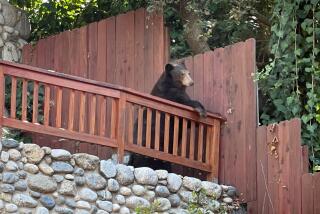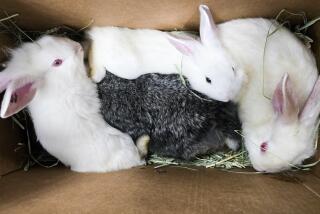N.H. man cares for 27 cubs, calls them ‘kids at a slumber party’
Ben Kilham likes bears, and thank goodness.
Last year New Hampshire’s volunteer state bear rehabilitator got a surprise: 28 orphan cubs.
Most years he takes in three or four motherless cubs, said Kilham, who has rehabilitated the animals for 20 years. Before this large bunch -- he started with 28, but released one with a radio collar before winter -- the most he’d ever had in one year was nine.
“It was a lot of extra work,” Kilham said through a laugh. “The analogy could be kids at a slumber party. There was always somebody up and somebody got somebody else up and soon they’d all be up.”
Kilham works in partnership with the state’s Fish and Game Department and -- with help from his wife and sister -- cares for the cubs in an enclosed eight-acre area on his property. Having such a large, rambunctious group this winter kept the cubs from their typical hibernation period.
For three weeks Kilham withheld food to try to get the cubs to go to sleep. Instead, they rototilled the pen and scavenged for food.
“We just gave up and ended up feeding them,” he said, adding that the cubs enjoyed the extra company. “They were much happier. There wasn’t any sign of anxiety with more bears.”
Several factors led to the sizable bunch, he said.
A biggie: the fluctuating food supply.
In 2011, the state had exceptionally hearty beechnut, apple and berry crops, Kilham said, which meant that almost every female bear -- even ones who were quite young -- were healthy enough to reproduce.
Last year, though, the food crop was terrible. Some sows got sick and died, and others abandoned their cubs.
There was also an uptick in humans shooting bears that began about 2008.
“Bears become pretty desperate,” Andrew Timmins, the state Fish and Game Department’s bear project leader told the Los Angeles Times. “If food isn’t present in the woods, they know how to find it in people’s backyards, in the form of bird feed or garbage or chickens.”
At least 16 of the cubs were orphaned last year after their mothers wandered into unenclosed chicken coops, where people shot and killed the bears, Timmins said. One week in June, three different chicken-related incidents in different parts of the state left nine cubs orphaned.
Timmins hopes last year’s high numbers make a point: Just because you can kill a bear on your property, it doesn’t mean you should.
“Let it be our plea to people to try to do our part,” he said. “These conflicts with bears really are avoidable. There are easier solutions.”
For one, the Fish and Game Department lends free electric fences for people to put around their chicken coops, Timmins said.
Although growing up in the wild is ideal, the department -- with Kilham’s help -- tries to give the cubs a good young life.
Once they’re about 18 months old, which is when wild cubs leave their mothers, Timmins said, the rescued groups get ear-tagged, loaded into a cage and released on state land.
“It’s the normal family breakup time,” he said.
ALSO:
Yellowstone to unveil new rules to control snowmobiles
Vegas Strip back to normal as police hunt for black SUV
Jerry Sandusky tries to appeal his jury conviction -- again
More to Read
Sign up for Essential California
The most important California stories and recommendations in your inbox every morning.
You may occasionally receive promotional content from the Los Angeles Times.











